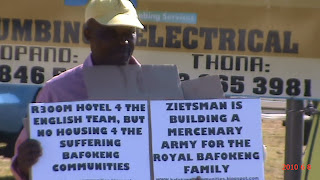The first ever African World Cup on African soil, without a single African coach was all a hoax, Blatter’s Party, set up to redicule the African people, and boasting to the world on how Africa is easily colonised, Thusi Rapoo ponders, and remembers the painful struggle, incarceration, and the gruesome death of the young Steven Bantu Biko.
Like the two years leading to the ANC’s 2007 Limpopo Conference when the nation waited in abated breath to the outcome of the Conference’ elections, the communities that form the Bafokeng ‘tribe’ were for the past three years, held under a magical spell, that the 2010 Fifa Wold Cup will usher in hundreds of thousands of wealthy tourists carrying bags of pounds to spend on their dusty rural villages. High on ecstasy, people spend sleepless nights planning, attending workshops, renovating, building, applying for finance, training (as tour operators), stocking,…
Now that the ‘national’ party is over, people nursing a World Cup babalaas, have started to ask….’what happened? What was the World Cup really all about? Where is the legacy?’
Around the Bafokeng, the few local people who got a little something out of the World Cup are the three taverners at Phokeng, and the construction workers who upgraded the Bafokeng stadium to the tune of R200m. Without informed projections and lack of access to finance, the taverners’ stocks were sold out long before their closing times, while the construction workers got four tickets each worth less than R1000 to watch mediocre games. The three hawkers in front of the Phokeng garage next to the stadium were very lucky not to have been kicked out, and had their dilapidated stalls upgraded.
On the flip side, SAB and DSTV must have made bumper sales, while poor taverners in areas located outside Phokeng could not sell their piled up stocks due to the cold winter and the absence of crime-phobic tourists.
Companies from Johannesburg and elsewhere that build and furnished the R327m Bafokeng hotel that accommodated the English team must be laughing all the way to the bank…. with the chief’s money.
In the end, the Bafokeng communities are left with two white elephants (a six star hotel and the stadium) that the communities, with their mining royalty earnings, must still maintain, for the affluent’s pleasures and enjoyment, while the very owners, the poor Bafokeng communities, still go to bed without food.
There is of course a much bigger picture of a huge, incalculable national loss, amounting to billions of rands that even SARS has not been able to account for.
On hindsight, and with Customs’ gates wide open, is it possible that tons of ounces of platinum could have been looted, clandestinely leaving our shores for Europe on the back of FIFA concessions?
Should we be thankful to Blatter for proving beyond reasonable doubt the naivety and sheer indifference of our leaders? Or was Blatter perhaps simply trying to prove that in their sober senses, our leaders can still be compelled to forget their song, their heroes, their struggles, while on the same breath dancing to Marley’s freedom song, and telling liberation stories about Biko’s black consciousness and the 1976 June 16 uprisings.
Blatter gave us Parreira, and the Bafokeng chief is notorious and on record for favouring whites over local ‘Bafokeng’ expertise when making key appointments in the tribal administration.
‘This is now, 2010, we are here, and Biko is long dead’, so they say.

.JPG)
.JPG)



















